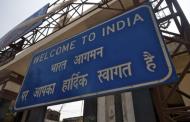- The marriage license was granted by Kings County in California
- Issued on November 7 for Manson and Afton Elaine Burton
- Burton left her Midwestern home nine years ago and moved to Corcoran, California — the site of the prison — to be near Manson
- Burton maintains multiple websites claiming Manson’s innocence
- Mass murderer Charles Manson has been issued a license to marry a 26-year-old woman who visits him in prison.
- The Kings County marriage license, viewed Monday by The Associated Press, was granted on November 7 for 80-year-old Manson and Afton Elaine Burton, who left her Midwestern home nine years ago and moved to Corcoran, California — the site of the prison — to be near Manson.
- She maintains several websites advocating Manson’s innocence.
Ranbir Kapoor-starrer “Bombay Velvet” will hit the screens May 15 next year. Directed by Anurag Kashyap, the romantic thriller also stars Anushka Sharma and Karan Johar in key roles. “We are all gearing up for the release of ‘Bombay Velvet’ May 15 next year. The film needed time to complete given the work that was pending and now we have locked a release date.
“An exciting marketing plan is being crafted as we speak to promote the movie in a way films have not been presented before,’ Kashyap said in a statement. The film is produced by Phantom Films and presented by Fox Star Studios. “‘Bombay Velvet’ is a very special film, a beautiful love story set against the rise of Bombay. It’s authentic, good cinema with amazing performances by Ranbir, Anushka and Karan,” Vijay Singh, CEO, Fox Star Studios, said in a statement.
We are excited to watch this hatke looking venture, what about you folks? Do you think Ranbir will live up to the expectations?
Mumbai airport handled over 3 million passengers in October due to growth in domestic traffic and addition of new flights to Abu Dhabi and Paris in the last few months.
Monthly passenger traffic crossed 3 million mark for the first time ever in May and second time in October. Domestic traffic accounts for 68% of the total and rest is international traffic.
In 2013-14 Mumbai airport handled about 32 million passengers and is second busies airport after but Delhi which handled 36.9 million passengers in the same period.
According to Mumbai International Airport Limited spokesperson the airport handled 3.04 million passengers in October and 3.15 million passengers in May. Previously the highest traffic movement was witnessed last December when it handled 2.9 million passengers.
Delhi, Bangalore and Goa are the busiest domestic routes while Dubai, London and Singapore are the busiest international routes form Mumbai.
Paris, Abu Dhabi and Kathmandu showed the fastest traffic growth amongst the international routes in April-September period. Passenger volume grew over 90 percent. Locally Amritsar, Kozhikode and Patna/Ranchi showed the fastest growth during this period and traffic to Amritsar was up 90 percent.
” The year 2014 is been an eventful year at Mumbai airport as it witnessed the inauguration of the iconic Terminal 2. Passenger numbers have seen record high during May and October this year. Growth has resulted due to Airbus A380 operations, additional frequencies to UAE, Paris, Colombo, Kathmandu Bangkok and new services by airlines like Malindo, Druk and flydubai,” MIAL spokesperson added.
Mumbai lost its number one rank to Delhi in 2009-10 due to capacity constraints and delays in modernisation of airport.
While Delhi airport with three runways handles 950 flights a day, Mumbai airport handles around 760 flights.
Mumbai airport has two intersecting runways which limits runway movements. The main runway has a capacity of 45 movements and can handle upto 48 movements a hour. The secondary runway has a capacity to handle 30-32 flights a hour. Simulatenous operations are not carried out. Sources said there are further limitations to increase air traffic movement. According to an official it will be difficult to increase aircraft movements beyond 50 per hour.
New Delhi: Deep-rooted gender inequalities continue to undermine India’s potential to translate economic growth into inclusive development, according to a government report which highlighted the inequality found in the education system.
Ads by GoSaveAd Options
It says gender is the most pervasive form of inequality that operates in India across all classes, castes and communities, posing a big challenge despite the progressive education policy.
The ‘Report on the Implementation of Beijing Declaration and Platform for Action’ says that issues of gender have been one of the most challenging in the progress made towards the goals of universalisation, inclusion, equity and quality in education.
The report will be submitted by Union Women and Child Development Minister Maneka Gandhi at the ‘Asian and Pacific Conference on Gender Equality and Women’s Empowerment: Beijing+20 Review’ which is underway in Bangkok since yesterday till November 20.
“Gender being the most pervasive form of inequality operates across all classes, castes and communities in India and is a big challenge despite having a progressive education policy with regard to gender,” it says.
“The education system still reflects the inequality found in the society outside the classroom. Continuous and sustained efforts are still required to bring the status of the girls at par with boys,” the report says.
It mentioned the setbacks or reversals in progress towards gender equality and empowerment of women that have been experienced since the adoption of the Beijing Declaration.
Between15th and 17th November representatives of International unions from around the world assembled in Mumbai, India under the auspices of the International Transport federation ITF and UNI Global Union.
According to their meetings with workers of DHL a lot of disturbing reports were found. To discuss the conditions of workers of DHL a Press Meet was held by the DHL employees union at Mumbai Press Club on 17th November.
The courier staff in India was found to be working for 12 hours a day apart from the travelling time spent to come to work. This is way above the norms set by the government of 8 working hours.
The DHL managing committee in India refused the pickup and delivery workers to join the union. This is also against the norms set by International labour Unions where an employee has the right to join such unions. The union also found hundreds of Indian pick and delivery workers labeled as fake managers and thus deprived of their rights to collectively bargain through their unions of choice.
However ITF and UNI who negotiate between the management and workers, bring about a understanding between the two parties for the smooth functioning a such companies. Therefore they are optimistic to bring about a solutions the problems come forth with their Indian counterparts.
New Delhi: The Supreme Court on Monday dismissed a plea of Jammu and Kashmir Awami National Conference (ANC) seeking postponement of assembly polls in the flood-ravaged state. A bench comprising chief justice H.L. Dattu and justice A.K. Sikri refused to direct the Election Commission to postpone the polls in the state on the ground that relief and rehabilitation work was still on.
During the brief hearing, senior advocate Rajeev Dhawan, appearing for the political outfit, said that free and fair election, in which all voters can participate, is not possible in the state which has a large population of internally displaced persons. Earlier a separate bench, before which the plea was mentioned, had referred it to the court of the chief justice of India (CJI). It was said the bench of CJI has been hearing a batch of petitions relating to relief and rehabilitation work in Jammu and Kashmir.
The plea, while seeking quashing of the election schedule till the situation becomes congenial for polls, had said that around 2,600 villages were hit by the floods and around 390 villages were submerged.
It had submitted that the rehabilitation work was still not complete, which posed a question if the EC would be able to ensure a free and fair election.
Investors haven’t been this bullish on India since 2003. But all of that took a turn for the worse with the financial market crash of 2008. While other countries in the emerging markets recovered quite well starting in 2010, thanks to stimulus packages and robust China demand for commodities, India became a “gasping elephant” as an HSBC analyst famously called it in 2012. GDP growth went from 10% in 2010 to 5% in 2013. Foreign direct investment in the country declined by 30% from its 2008 levels.
Two years later, the pendulum has swung.
Optimism for doing business in India is rising. Sentiment improved when Narendra Modi was elected prime minister on a business-friendly reform agenda in May 2014, though positive signs were evident before the election. Even under the ruling Indian National Congress at the time, mired in a political quagmire that made the last two years of its rule hobbled by policy paralysis, the INC managed to permit greater foreign investment in airlines. United Arab Emirates’ Etihad Airwas was the first to bite, acquiring a stake in Jet Airways. Other policies were hamstrung by politics, primarily retail ownership by foreigners.
A survey conducted last summer by Ernst & Young found that 53% of more than 500 business leaders around the world planned to enter or expand their operations in India within the following 12 months. The list of multinationals that are making long-term investments in India includes U.K. liquor company Diageo , which acquired majority ownership of United Breweries, once run by Indian billionaire Vijay Mallya; French energy company GDF SUEZ ; pharmaceutical giant GlaxoSmithKline; Sweden’s IKEA; Singapore Airlines; Starbucks, which partner with the Tata Group; U.K. retailer Tesco; Unilever, Vodafone and Volkswagen all upped the ante on Modi.
India is loved for its domestic market. Young, relatively poor, and with a long way to grow. GDP per capital is under $2,000 annually and expected to double by 2021 to $2,700.
Still, the challenge of doing business in India is greater than any of the big emerging markets. The World Bank ranks India last in terms of ability to enforce contracts and in ease of doing business, which includes regulatory approval and permits.
Persistent corruption also compounds the challenges. Sixty-nine percent of respondents to the 2013 Ernst & Young survey said fraud is an inevitable cost of doing business in India. Many foreign investors may be motivated as much by fear as by optimism—compelled by the belief that they must invest in India to achieve their ambitions, even though they know the risks are great and the outcome is highly uncertain, said White & Case corporate lawyers in a 14 page white paper titled “Navigating India: Lessons for Foreign Investors”
Terminator 2: Judgment Day (1991)
| Release | : | 1991-07-03 |
| Country | : | France,United States of America |
| Language | : | English,Español |
| Runtime | : | 137 |
| Genre | : | Action,Thriller,Science Fiction |
Synopsis
Watch Terminator 2: Judgment Day Full Movie Online Free. Movie ‘Terminator 2: Judgment Day’ was released in 1991-07-03 in genre Action,Thriller,Science Fiction.
Nearly 10 years have passed since Sarah Connor was targeted for termination by a cyborg from the future. Now her son, John, the future leader of the resistance, is the target for a newer, more deadly terminator. Once again, the resistance has managed to send a protector back to attempt to save John and his mother Sarah.
Streaming Movie Terminator 2: Judgment Day
(1991) Online
Incoming search term :
Watch Terminator 2: Judgment Day Full Movie Online Free Streaming In HD Quality, watch full Terminator 2: Judgment Day movie, Watch Terminator 2: Judgment Day 1991
Online Free Viooz, Watch Terminator 2: Judgment Day 1991 Online Free, Watch Terminator 2: Judgment Day 1991 Online Putlocker, film Terminator 2: Judgment Day
online, Streaming Terminator 2: Judgment Day 1991 For Free Online, streaming movie Terminator 2: Judgment Day 1991, Terminator 2: Judgment Day film trailer,
Terminator 2: Judgment Day movie trailer, live streaming film Terminator 2: Judgment Day 1991, Streaming Terminator 2: Judgment Day 1991 Online Free Megashare,
movie Terminator 2: Judgment Day streaming, Watch Terminator 2: Judgment Day 1991 For Free online, film Terminator 2: Judgment Day 1991 online streaming,
download Terminator 2: Judgment Day 1991 movie now, movie Terminator 2: Judgment Day 1991 download, watch full movie Terminator 2: Judgment Day 1991, trailer
film Terminator 2: Judgment Day 1991, Watch Terminator 2: Judgment Day 1991 Online 123movies, Watch Terminator 2: Judgment Day 1991 Online Free 123movie, Watch
Terminator 2: Judgment Day 1991 Online Free Putlocker, movie Terminator 2: Judgment Day 1991 trailer, Watch Terminator 2: Judgment Day 1991 Online Free
netflix, watch Terminator 2: Judgment Day film online now, Terminator 2: Judgment Day 1991 movie streaming, Terminator 2: Judgment Day 1991 Watch Online, Watch
Terminator 2: Judgment Day 1991 Online 123movie, download movie Terminator 2: Judgment Day, Watch Terminator 2: Judgment Day 1991 Online Free megashare, watch
Terminator 2: Judgment Day movie now, Watch Terminator 2: Judgment Day 1991 Online Free hulu, Watch Terminator 2: Judgment Day 1991 Online Viooz, live streaming
movie Terminator 2: Judgment Day 1991, Terminator 2: Judgment Day live streaming film online, movie Terminator 2: Judgment Day 1991, Watch Terminator 2: Judgment Day 1991 Online
Megashare.
The financial capital of the country has emerged as the most vacation-deprived city among the five surveyed towns, as most Mumbaikars enjoy working more than relaxing at vacations, says a recent study.
“Vacations play an important role in maintaining the work-life balance, and general well-being of the employees while re-energising them to be more focused at work. However, Mumbaikars lead in enjoying work more than relaxing at vacations as a majority of them take lesser vacation days than they are awarded,” Expedia Managing Director, Asia, Vikram Malhi said.
This, he said, makes Mumbaikars top the vacation-deprived city among the other surveyed towns in the country.
According to online travel agency Expedia.com’s 2014 Vacation Deprivation report, 97 per cent Mumbaikars’ vacation are deprived, 96 per cent are willing to make sacrifices for extra vacation days and 42 per cent feel guilty for taking a vacation.
However, the capital city of Delhi is the least vacation-deprived, the report said.
In Delhi, people start planning for next vacation within a week of coming back and most (99 per cent) are willing to make sacrifices like giving up on television and junk food for an additional vacation day.
“Delhiites are least vacation-deprived as compared to other metro cities in India. About 60 per cent of people in Delhi would prefer more vacation days instead of money. They are also ready to sacrifice on things like junk food, Internet and television, but find it relatively difficult to part with their booze for an extra day of vacation. About 7 per cent of them actually book it before landing back from their current vacation,” Malhi said.
The Expedia survey was conducted in five cities of Delhi, Mumbai, Pune, Bangalore and Hyderabad by Northstar from August 25 to September 17, 2014.
Puneites, despite having the most supportive bosses, feel they are vacation-deprived, because most of them feel they do not get enough vacation days, the survey said.
Almost half of Puneites start to relax as soon as they start their vacation and three-fourth of them associate overall happiness with vacation, it added.
It further said that Puneites are ready to give up dessert, social media, sex, taking a shower and Internet for one extra day of vacation.
Bangalore is at the top for several short vacations or long weekend instead of one long vacation.
The survey said Bangaloreans are workaholics as they are the highest to start enjoying their vacation when almost more than half of it is over.
Almost half of them blame it on their spouse or partner, work demand or other family members for not taking vacations.
They make up by taking multiple short vacations, it said.
It added that even as Hyderabadis are the highest to travel for weddings or family obligations, about 52 per cent never take all vacation days that they are entitled to and 67 per cent prefer a pay raise over more vacation days.
The survey found that for Hyderabadis, vacation planning is the number one priority and they plan their next vacation within more than a month of returning from holiday.
A quarter of these vacations are related with weddings or family obligations, highest amongst the cities surveyed, it added.
PM says ‘red warning lights are flashing’ against a backdrop of instability and uncertainty, as G20 summit draws to a close
David Cameron has issued a stark message that “red warning lights are flashing on the dashboard of the global economy” in the same way as when the financial crash brought the world to its knees six years ago.
Writing in the Guardian at the close of the G20 summit in Brisbane, Cameron says there is now “a dangerous backdrop of instability and uncertainty” that presents a real risk to the UK recovery, adding that the eurozone slowdown is already having an impact on British exports and manufacturing.
His warning comes days after the Bank of England governor, Mark Carney, claimed a spectre of stagnation was haunting Europe. The International Monetary Fund managing director, Christine Lagarde, expressed fears in Brisbane that a diet of high debt, low growth and unemployment may yet become “the new normal in Europe”.
Cameron has adopted the more sombre tone in the runup to the chancellor’s autumn statement on 3 December, when the Office of Budget Responsibility will produce new growth forecasts and spell out the impact on public finances.
“The eurozone is teetering on the brink of a possible third recession, with high unemployment, falling growth and the real risk of falling prices too,” Cameron writes. “Emerging market economies which were the driver of growth in the early stages of the recovery are now slowing down. Despite the progress in Bali [trade talks in 2013], global trade talks have stalled while the epidemic of Ebola, conflict in the Middle East and Russia’s illegal actions in Ukraine are all adding a dangerous backdrop of instability and uncertainty.”
The emphasis on potential dangers, balancing some more hubristic ministerial accounts of the state of the UK economy, reflects Cameron’s concern – underlined by conversations at the G20 – about the extent to which Britain can detach itself from gathering economic storms.
Politically, Conservatives believe an emphasis on the risks still facing the UK will make anxious voters recoil from handing stewardship of a fragile economy to a relatively untried Labour team.
Some recent polling has seen the economy decline as an issue for voters, partly because there is a belief that the recovery is secured, leading to issues such as the health service and living standards, which have been seized upon by Labour, to rise in importance.
But with Germany, Europe’s manufacturing powerhouse, growing by just 0.1% in the third quarter, the eurozone economy appears to be faltering.
A European Central Bank (ECB) survey showed that inflation would remain at worryingly low levels before picking up slightly next year. The annual inflation rate in the eurozone was near a five-year low of 0.4% in October and the ECB expects a rate of 0.5% for 2014 – well below the target of close to 2%.
The EU may also be only one or two new rounds of sanctions away from pushing Russia into a deep recession as punishment for its interference in Ukraine, a point made in Brisbane by the Russian president, Vladimir Putin.
Cameron stresses that retreating from the world or imposing extra tax and borrowing may seem easy solutions but they would instead prove only to be a repeat of the mistakes of the past.
He claims that the G20 communique hammered out over the past few days endorsed Britain’s determination to use monetary policy to support growth and he would not waver on his policy of paying down government debt.
The summit, dogged by controversies over Ukraine, extra aid to fight Ebola and climate change, was hailed as “a weekend of achievement” by the Australian prime minister, Tony Abbott. He said the group of leading nations had managed to “shift a gear”, by moving from a responsive to a proactive stance on world events.
World leaders pledged 800 separate measures designed to lift their combined economic growth by an additional 2.1% above the current trajectory by 2018 compared with 2013 – a measure the IMFIMFand OECD have calculated would add more than US$2tn (£1.3tn) and millions of jobs to the global economy.
Much of the growth would come from infrastructure investment and getting an extra 100 million women into the labour force.
None of the commitments are binding on national governments, so there is some scepticism that the Brisbane action plan will be able to have the transformative effect it promises, but Cameron said if the pledges were kept, it would mean “an extra Australia and New Zealand” added to the world economy. The G20 had credibility, he argued, since it had shown its effectiveness by pushing through reforms to achieve bank stability in the past.
He said the G20 had taken fresh steps to clamp down on corporate tax avoidance, pointing out that 92 tax authorities were now cooperating by sharing information which would enable G20 countries to raise an extra $32bn in tax revenues.
“This is not some arcane dry and dusty subject,” Cameron said at his closing press conference. “The more we can make sure big corporations pay their taxes properly, the less we have to tax hardworking people who I want to make sure can keep more of their own money so they can spend as they choose.”
But the TUC general secretary, Frances O’Grady, said: “Too many world leaders seem to think any jobs will do when they should be thinking about the security and quality of those jobs. The same story of casualisation, part-time work and insecurity in the labour market is spreading across the world.”
Chris Leslie, shadow chief secretary to the Treasury, said: “David Cameron claims his policies are working, but as even Sir John Major admits, most people still aren’t feeling the recovery.
“Working people are £1,600 a year worse off under his government, borrowing is going up so far this year and exports have fallen behind our competitors. David Cameron should be trying to strengthen growth and make sure working people finally benefit from it, not making excuses for slower growth.”








![Online [Free Watch] Full Movie Terminator 2: Judgment Day (1991)](http://www.realnewsofindia.com/wp-content/uploads/2014/11/viel-system-190x122.jpg)









Recent Comments